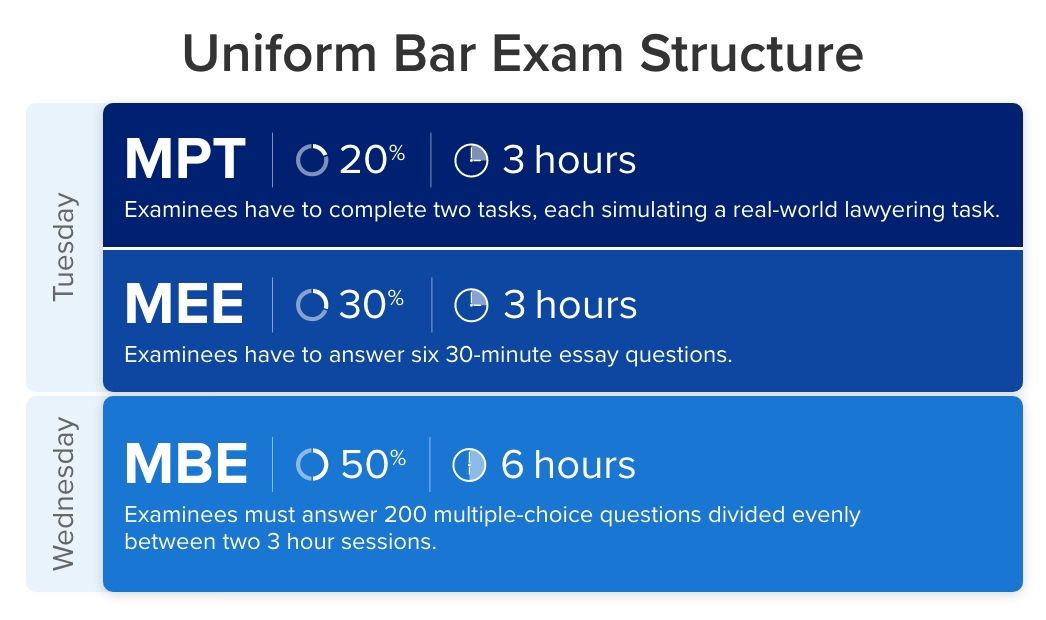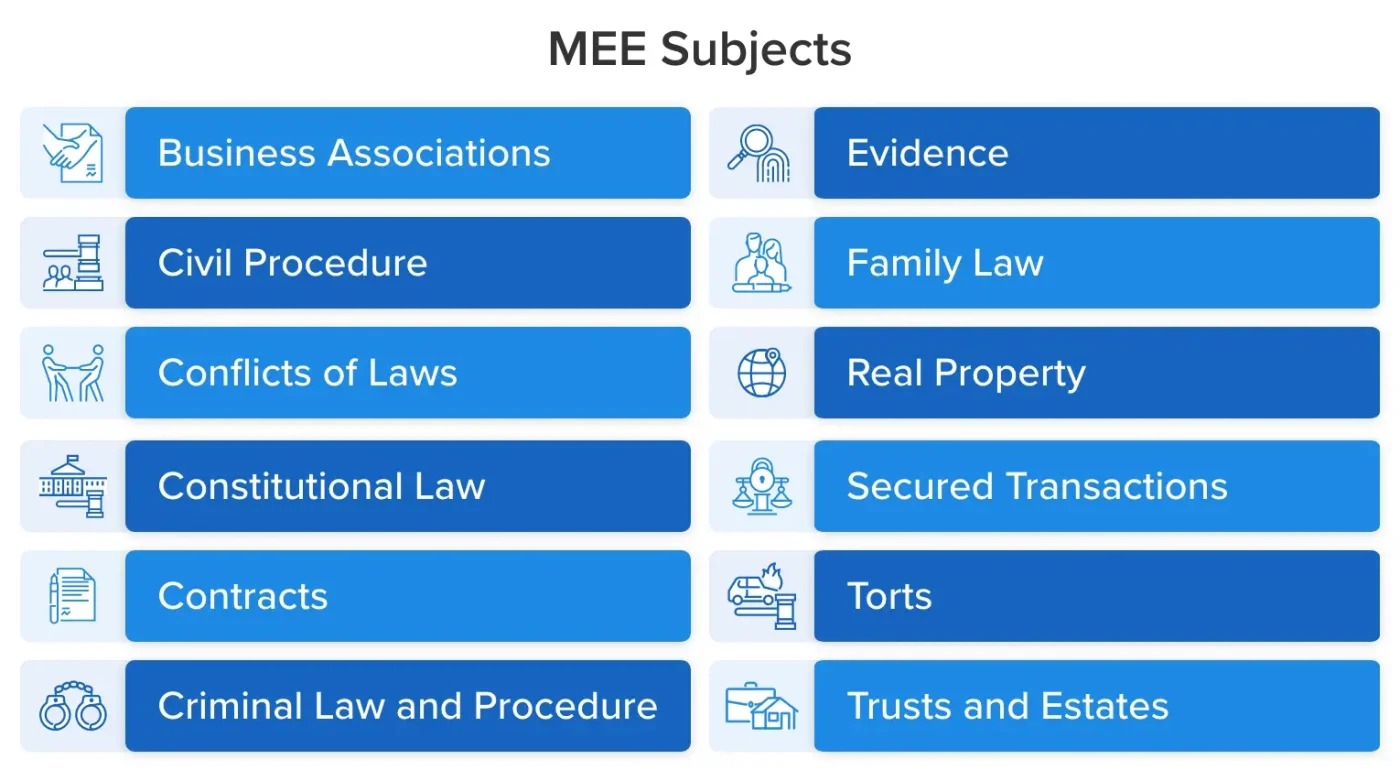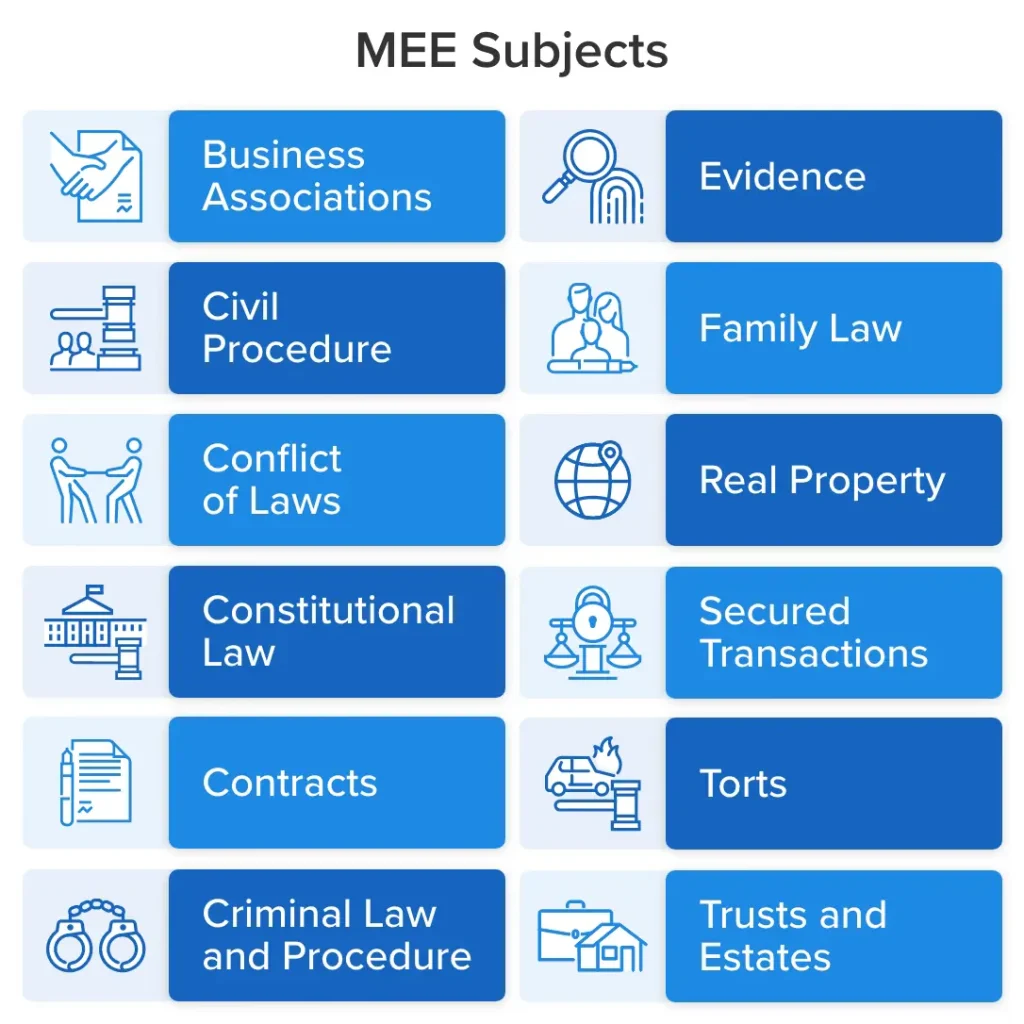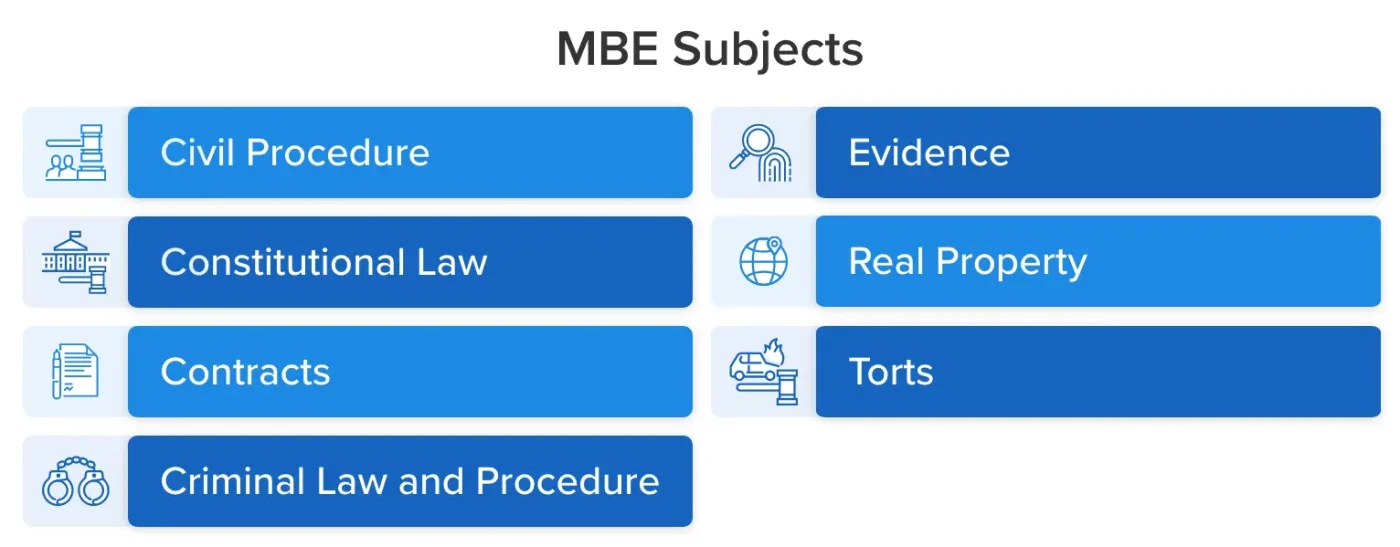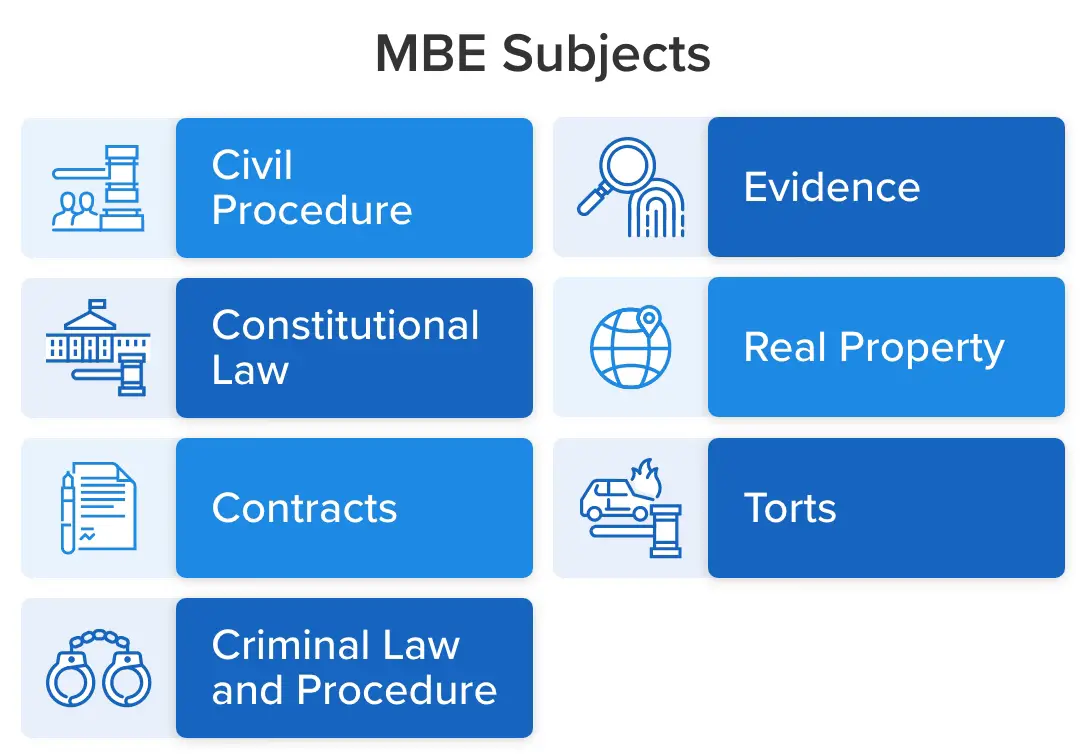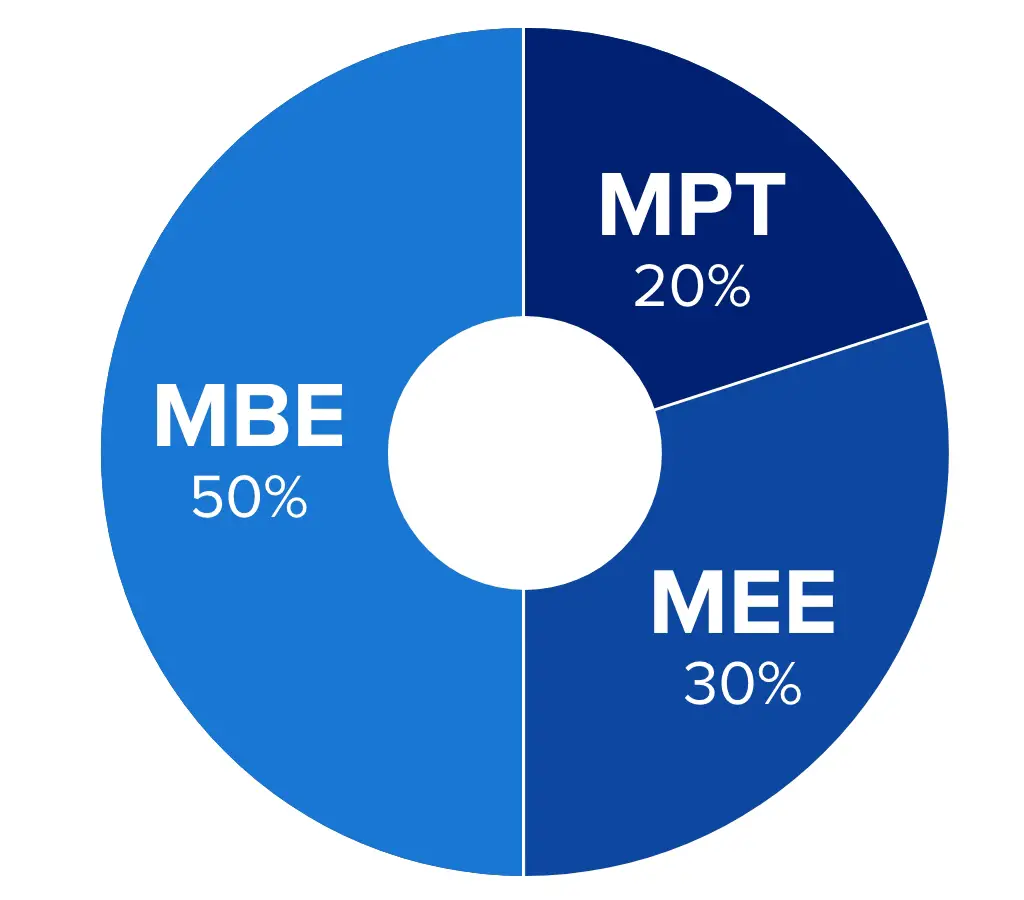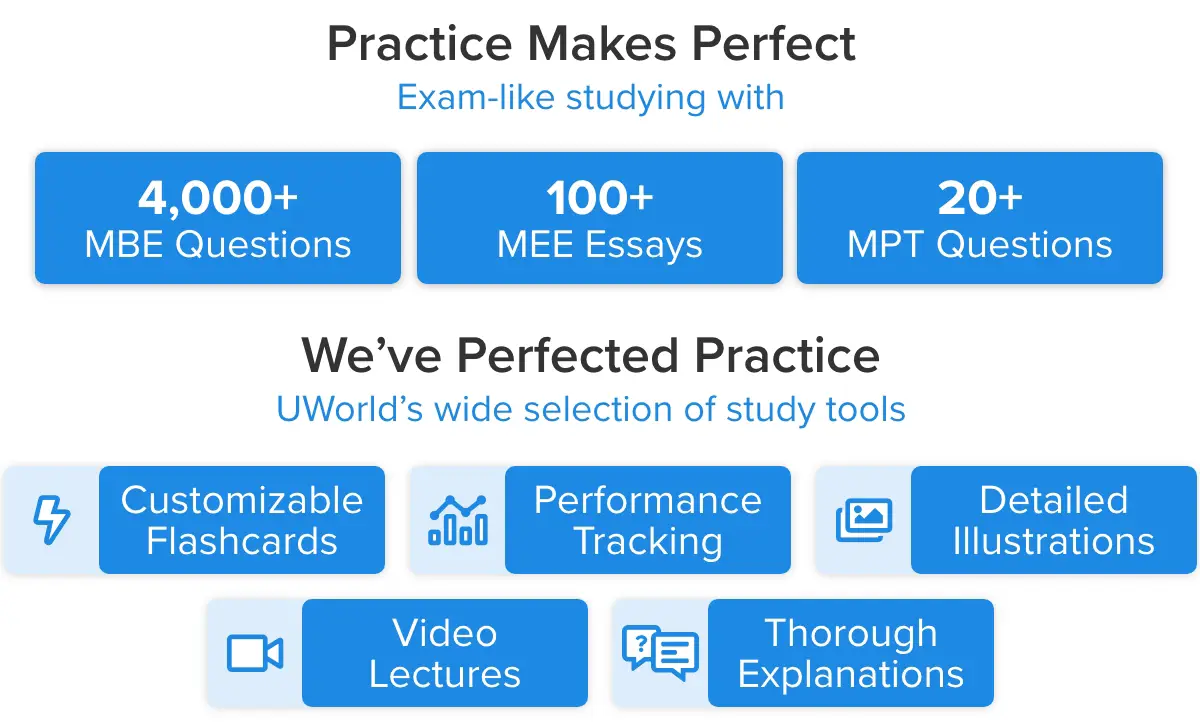The Oregon Bar Exam
The Oregon Bar Exam adopted the Uniform Bar Examination (UBE®) format in July 2017. The UBE is divided into three sections—the Multistate Bar Examination (MBE®), the Multistate Performance Test (MPT®), and the Multistate Essay Examination (MEE®). The exam has been designed to assess a candidate's understanding of a wide range of legal topics and the ability to apply that knowledge in various situations.
In June 2022, the Licensure Pathways Development Committee (LPDC) approved the adoption of two new pathways for admission to the Oregon State Bar. However, the UBE remains the most common and direct route to admission, and successful examinees can transfer their scores to one or more of the 41 participating jurisdictions. If you're preparing to take the OR Bar Exam, this article provides everything you need regarding results, requirements, dates, deadlines, fees, applications, and more.
Oregon Bar Exam Structure
The UBE is divided into 2 days, each with 6 testing hours. The writing portion (MPT/MEE) is administered on day one, and the MBE on day 2. See below for a detailed breakdown.
Oregon Bar Exam Dates, Requirements, and Scheduling
Preparing your application for the Oregon Bar Exam and submitting it before the first filing deadline will save you from paying a $375 late filing fee. See below for details.
Exam dates
| Filing Periods | February 27-28, 2024 | July 30-31, 2024 | Fee |
|---|---|---|---|
| Timely Filing Deadline | November 15, 2023 | April 15, 2024 | $750 |
| Late Filing Deadline | December 15, 2023 | May 15, 2024 | $1,125 |
Requirements
To sit for the OR Bar Exam, you must have graduated with a Juris Doctorate degree (JD) or a Bachelor of Laws degree (LLB) from a law school approved by the American Bar Association (ABA). If you graduated from a non-ABA-approved law school in another state, you can still take the Oregon Bar Exam if you've been admitted to practice before the highest court in another US jurisdiction and have been actively engaged in the practice of law for a minimum of 3 of the 5 years preceding your application submission.
Scheduling
To file an application to sit for the Oregon Bar Exam, first be sure to read through the official application instructions carefully. You can obtain all application forms through the Admissions Department's website. All PDF forms must be completely filled in, printed, signed, scanned, and uploaded to the SmartSheet application found on the OSB Admissions homepage. If you choose to submit your application through the mail, use the following address:
| Mailing Address |
PO Box 231935 |
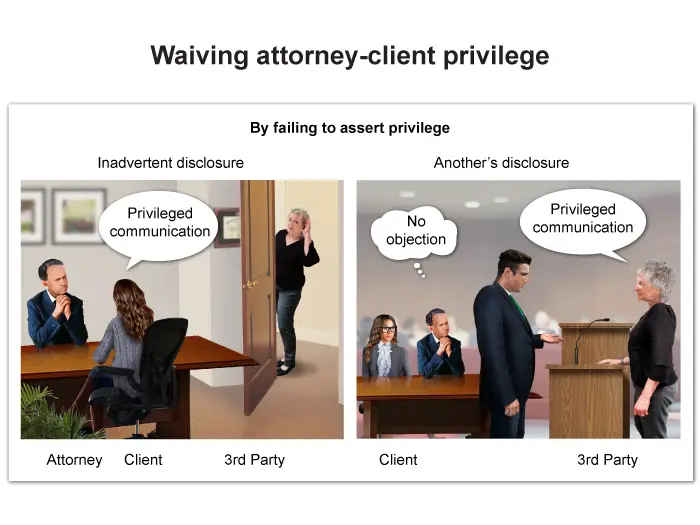
Oregon Bar Exam Cost and Fees
Fees and costs associated with registering for the Oregon Bar Exam vary depending on the examinee's status and the date they file. Below is a detailed and up-to-date list of exam-related fees.
| Application Fees | ||||
|---|---|---|---|---|
| Timely Filing | $750 | |||
| Repeater | $750 | |||
| For Attorneys | $1,350 | |||
| Other Application Fees | ||||
| Late Filing Fee | $375 | |||
| Character and Fitness Investigation* | $600 | |||
| Comity Admission Application Fee | $1,750 | |||
| Conversion Application | $875 | |||
| Bar Exam Investigation | $600 | |||
| Bar Exam Investigation - Reapply | $300 | |||
| Conversion Application | $875 | |||
| Foreign Law Consultant Application | $2,500 | |||
| Temporary Practice Application | $500 | |||
| Military Spouse Application | $1,350 | |||
| Law Teacher Application Fee | $1,350 | |||
| UBE Score Transfer | $1,350 | |||
| Miscellaneous Fees | ||||
| Laptop Use Fee | $150 | |||
*If you previously applied for the bar exam within the last 12 months and paid a $600 investigation fee, you will only owe $300.
Payment Policies
You can pay for fees associated with the Oregon Bar Exam through the Oregon State Bar's product catalog. Applicants who were previously admitted to practice law in another jurisdiction or have a pending application for admission in any jurisdiction must pay an additional $600 investigation fee. All fees are non-refundable (Rule 4.10).
Cost-Saving Options
Fees for applying for the Oregon Bar Exam can quickly add up. Fortunately, there are cost-saving options available for the application and your legal education in general. The Oregon State Bar offers a number of mentorship programs, stipend programs, and bar exam grants aimed at advancing equality in the justice system.
If you don't qualify for the above cost-saving options, you can browse the AccessLex Institute Law School Scholarship Databank for cost-saving options suited to you. Furthermore, the ABA offers 100+ opportunities and programs for young lawyers and law students annually. There are also some simple actions you can take to save money as you work toward bar admission:
- Join a study group and split the cost of bar exam preparation materials among group members.
- Research free or low-cost study online study materials like past bar exam questions and answers to supplement commercial study aids.
- Some bar exam prep companies offer discounts or promotions to students who register early or refer friends to their program.
Oregon Bar Exam Subjects and Topics
The OR Bar Exam tests an examinee's ability to analyze and reason alongside their knowledge and understanding of fundamental legal principles. Furthermore, since Oregon has adopted the UBE, a successful exam score represents one's competency and readiness to practice law in the 40 other participating jurisdictions.
MEE: Testable subjects
The MEE consists of six 30-minute essay questions. Each question involves one or more of the subjects listed below. Some subjects may be paired together. Other subjects could be omitted. While it's impossible to know which subjects the National Conference of Bar Examiners (NCBE®) will choose on any given exam version, some have been tested more frequently than others historically.

Themis courses include unlimited essays for practice, simulation, and a dedicated attorney essay grader.
For example, Civil Procedure has appeared on nearly every MEE in the past decade, while Criminal Law has only appeared several times. However, subjects that occur less frequently on their own may be paired with others. Our MEE Study Guide and Prep Tips provide all the details you need to focus your studies on what's essential and use your time efficiently.
Check out our MEE Subject Matter Outline for detailed explanations of MEE subjects and sub-topics.
MBE: Testable subjects
The MBE is administered in two 3-hour sessions on (Day 2) of the bar exam on the last Wednesday in February and July. It is scored on a 200-point scale and presents candidates with 200 multiple-choice questions spanning the following MBE subjects, broken down into 25 questions per subject:
MPT: Testable items
The MPT consists of closed-universe practical questions with instructions, factual data, cases, statutes, and other reference material supplied by examiners. Candidates will answer two cases presenting simulated real-life scenarios occurring in the fictional jurisdiction of "Franklin." These tasks are designed for examinees to demonstrate their lawyering skills, using only the materials provided by the bar examiners. Each case is assessed on a 6-point scale, with a 6 being the highest possible score and a 0 being the lowest possible score.
Oregon Bar Exam Scoring/Grading
In order to become a member of the Oregon Bar, candidates are required to achieve a minimum scaled score of 270 out of 400 on the UBE. The UBE consists of three sections, each with a different weightage: MBE (50%), MEE (30%), and MPT (20%). The MEE and MPT are combined and given half the weightage of the exam. This means that the writing section (MEE/MPT) and the multiple-choice section (MBE) each account for 50%, or 200 points, of the total scaled score. If a candidate performs poorly in one section, they can compensate for it by doing well in the other, as long as their total scaled score is 270 or above.
It's important to note that scoring 135 out of 200 on the MPT does not necessarily equate to earning 135 scaled points. The scaled scoring system is used to ensure fairness in evaluating exam performance. Raw scores are converted into scaled scores so that candidates are judged based on the same standard regardless of the exam's difficulty level. However, the specific formula used by the NCBE to calculate scaled scores is not publicly disclosed.
Oregon MPRE Minimum Passing Score
The Multistate Professional Responsibility Examination (MPRE®) is a two-hour exam consisting of 60 multiple-choice questions. In Oregon, passing the MPRE with a minimum score of 85 is a requirement for admission to the Oregon State Bar. Applicants must pass the MPRE within 36 months of applying for admission or while their application is pending. For further information on this mandatory test, please refer to our article "About the MPRE."

Oregon Bar Exam Results and Pass Rates
As is common with bar exams across the United States, the Oregon Bar Exam's pass rate for repeaters is considerably lower than for those taking it for the first time. This is likely because many repeat takers don't substantially modify their study habits.
| Exam | Overall Pass Rate |
First-Timer Pass Rate |
Repeater Pass Rate |
Results Release Date |
|---|---|---|---|---|
| July 2023 | 69% | 75% | 30% | September 22 |
| Feb. 2023 | 40% | 58% | 26% | April 28 |
Below are the annual pass rates for the Oregon Bar Exam since 2017 divided into first-time examinees and repeaters:
| Exam | First Timers | Repeaters | Overall | |||
|---|---|---|---|---|---|---|
| Year | No. Of Candidates |
Pass Rate |
No. Of Candidates |
Pass Rate |
No. Of Candidates |
Pass Rate |
| 2022 | 445 | 77% | 86 | 49% | 531 | 73% |
| 2021 | 438 | 81% | 64 | 38% | 502 | 75% |
| 2020 | 318 | 86% | 131 | 52% | 449 | 76% |
| 2019 | 429 | 81% | 135 | 33% | 564 | 69% |
| 2018 | 487 | 76% | 135 | 46% | 622 | 70% |
| 2017 | 477 | 82% | 190 | 59% | 667 | 75% |
Oregon Bar Exam Results
The July 2023 exam results were released on September 22, 2023, and on April 28, 2023, for the February 2023 exam. Generally, exam results are released 7 weeks after an exam.
What Makes the Oregon Bar Exam Unique?
The Oregon Supreme Court approved the adoption of two additional pathways for admission to the Oregon State Bar. Law graduates will have two pathways to licensure without taking the bar exam starting in May 2024:
- The Oregon Experiential Portfolio Pathway (OEEP) — Experience-based curriculum in their second and third years of law school. Students will develop a portfolio of work to be examined by the Board of Bar Examiners. This pathway is available to students at one of Oregon's 3 law schools.
- The Supervised Practice Pathway Examination (SPPE) — Supervised apprenticeship program following graduation from law school. Students will submit their work to the Board of Bar Examiners.
Reciprocity
Oregon grants Comity Admission (i.e., without examination) to active attorneys from US jurisdictions that admit Oregon-licensed attorneys without examination. You must have a JD from an ABA-approved law school and have been actively engaged in the practice of law (i.e., a minimum of 30 hours per week) for at at least 24 of the 48 months preceding submitting your application. Comity Admission applicants must also take 15 hours of continuing legal education approved by the Board, including:
- 2 credit hours covering Legal Ethics (Oregon Code of Professional Responsibility)
- 4 credit hours covering introductory Civil Procedure (Oregon State Court and United States District Court of Oregon local rules)
- 3 credit hours covering Oregon State Court civil procedure, emphasizing the unique aspects
- 9 credit hours covering one or more of the following subjects: Oregon Administrative Law, Oregon Constitutional Law, Contracts, Corporations, Criminal Law and Procedure, Decendent's Estates, Oregon Domestic Relations, Employment Law, Evidence, Local Federal Court Practice and Procedure, Legal and Equitable Remedies, Oregon Legislation, Partnerships, Oregon Court Practice and Procedure, Real Property, Torts, Trusts, UCC II - Sales, UCC III - Negotiable Instruments/Commercial Paper, UCC IX - Secured Transactions.

Final Takeaways
The Themis + UWorld Bar Review bundle offers 4000+ MBE practice questions. Each question has been curated by our premier team of legal professionals or is licensed by the NCBE.
You'll gain access to 100+ MEE practice essays and dozens of MPT practice questions from past exams. In addition, our platform offers customizable flashcards, performance tracking, industry-leading answer explanations filled with detailed illustrations and charts, readings paired with bite-sized video lectures, and thorough explanations for each question.
Like other UBEs, the OR State Bar Exam will be a challenging experience. But we are confident that if you prepare with the right bar prep review, you can perform well on the MBE and pass the bar exam.
Oregon Bar Exam for foreigners
As a foreign applicant, you may be eligible to take the Oregon Bar Exam if you've graduated from a law school in a foreign jurisdiction and can document the following:
- The requirements for admission to practice in the foreign jurisdiction are "substantially equivalent" to those of Oregon
- You are currently admitted to practice law in a foreign jurisdiction where "the Common Law of England exists as a basis of its jurisprudence"
- You have graduated from a law school with academic standards commensurate with those set by the ABA
Note that the Oregon Board of Bar may require you to pay for a commercial evaluator of the Board's choosing to evaluate your legal education.
Contact Details of the Oregon State Bar
If you wish to contact the Oregon State Board of Law Examiners office with inquiries regarding the Oregon Bar Exam, please see the details below.
| Medium | Info |
| Phone Number | (503) 620-0222 ext. 310 |
| [email protected] | |
| Mailing Address | PO Box 231935 Tigard, OR 97281-1935 |
Oregon Bar Exam FAQs
How long Is the bar exam in Oregon?
Can anyone take the bar exam in Oregon?
To take the bar exam in Oregon, you must have a JD or LLB from an ABA-approved law school or have received foreign legal education of similar quality and duration. For details, see the “requirements” section of this article.
How hard Is the Oregon Bar Exam?
What are Oregon Bar Exam application deadlines and fees?
How many times can I take the Oregon Bar Exam?
How much does it cost to retake the Oregon Bar Exam?
What is the minimum passing UBE score for Oregon?
Does Oregon offer reciprocity with any jurisdiction?
Attorneys from any US jurisdiction can apply for Comity Admission if they meet these criteria.
Can I transfer my MBE score from another jurisdiction to Oregon?
Yes, you can transfer your MBE score from another jurisdiction to Oregon. You must have earned a scaled score of 135.
Can I transfer my Oregon UBE score to another jurisdiction?
Yes, you can transfer your Oregon UBE score to another jurisdiction if that jurisdiction accepts UBE score transfers.
What is the time limit for accepting a transferred UBE score in Oregon (i.e., maximum age of the UBE score)?
What is the admission without examination process like?
Oregon allows for admission without examination on the basis that the candidate has been actively practicing law for a minimum of 30 hours per week for 24 of the past 48 months. For details on the process, see the “Reciprocity” section of this article.
How long does it take to study for the Oregon Bar Exam?
Can you practice law without a law degree in Oregon?
How do I become a licensed attorney in Oregon?
How to request special accommodations for the Oregon Bar Exam?
If you are seeking special testing conditions, you can obtain special accommodation forms from the Admission Department webpage in the Forms Library. Forms must be submitted by the timely filing deadline.
